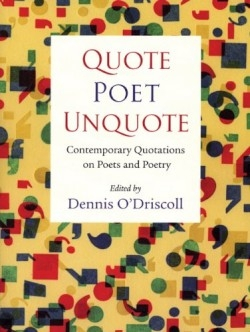Quote Poet Unquote
Contemporary Quotations on Poets and Poetry
By day poets masquerade as mere mortals: insurance clerks, teachers, librarians. But by night they prowl like panthers, seizing words on the run and crunching raw emotion. —Unattributed, The Times, 4 September 2006.
Poetry: What is it? “Poetry is language that sounds better and means more,” says Pulitzer Prize-winner Charles Wright. It’s “relaxation from the labours of inebriation” says that old crumb Unattributed in Acumen on the cold January of 1995. Bakeless Prize-winner Jennifer Grotz says “Poetry is philosophy’s sister, the one that wears make-up.” And Don Paterson, author of The White Lie, says, “A poem is a machine for remembering itself.”
Dennis O’Driscoll, erstwhile editor of Poetry Ireland Review, made a career out of collecting bits and pieces, “sound bites” as he calls them, of larger debates. The quotations “trapped and caged” in Quote Poet Unquote represent twenty years of collecting, and are principally derived from remarks published in newspapers and journals. But, as the editor emphatically states, he “makes not the slightest claim to comprehensiveness.” The book does, however, include sources, indices of the poets speaking and bespoken (or about), and it questions the authority of the most stubborn of classroom axioms.
“If you write about what you know,” says George Bowering, “you will keep on writing the same thing, and you will never know any more than you do now.” But worry not: “The fear of straight speaking, the constant, painstaking efforts to metaphorize everything, the ceaseless need to prove you’re a poet in every line: these are the anxieties that beset every budding bard. But they are curable, if caught in time.” This from Nobel Prize-winner Wislawa Szymborska.
O’Driscoll has organized the quotations into sections. There’s “Youth and Age:” Death is what gets poets up in the morning. —Billy Collins. “Best Words” and “Visualizing a Poem”: Poetry gets landscape and weather for its subjects; the novel gets boxing and tattooed women and sex. —Craig Raine.” Word Count” and “Poetic Drive:” Poets are known for being non-drivers, and it seems that many also have difficulty in using their telephone-answering-machines (not to mention speaking into other people’s.) —James Campbell.
Any opinion will find its justification—which is precisely what will make this fun for classrooms and, yikes, workshops. (Babies are not brought by storks, and poets are not produced by workshops. —James Fenton.) For example, Michael Ondaatje says that “Poems get ruined by having too many ideas in them,” while Katha Pollit remarks “Nobody is truly indifferent to the ideas in a poem, and to say that you should be indifferent is really to say that poetry is a decorative art, it’s contentless, it’s like making lace or a quilt.”
There is poetry for those who have little to say: My optimum time to write is when I don’t have much to say, as opposed to when I was young and had plenty to say about everything. My poetry was liberated by that realization. I got better right away. —Billy Collins. For those who have too much there is: Foul-mouthed and pot-bellied, ravaged by self-neglect and alcohol abuse, with a huge misshapen head, matted hair and lumpy, pitted, porridge-coloured skin, he looked in his prime like something risen from the dead. —Hilary Spurling, on Charles Bukowski. Ah, “How many attempts to get poetry on the road have foundered because the poetry entrepreneurs have rolled all over the tarmac trying to gouge out each other’s eyes?” muses poet, lecturer, and actor P.J. Kavanagh.
But getting back to the basics, Michael Longley writes: “Technique is important. I think that if most people who called themselves poets were tight-rope-walkers they’d be dead.” James Fenton contributes to this drift with: “It would be very odd to go to a concert hall and discover that the pianist on offer wasn’t any good at all, in the sense that he couldn’t actually play the piano. But in poetry this is an experience we have learned to take in our stride.”
Up and down and sideways and backwards, Quote Poet Unquote is a handy and delightful ars poetica as well as a reminder that “Poetry is rarely a victimless crime.” —Robert Crawford, London Review of Books, 2007.
Disclosure: This article is not an endorsement, but a review. The publisher of this book provided free copies of the book to have their book reviewed by a professional reviewer. No fee was paid by the publisher for this review. Foreword Reviews only recommends books that we love. Foreword Magazine, Inc. is disclosing this in accordance with the Federal Trade Commission’s 16 CFR, Part 255.

